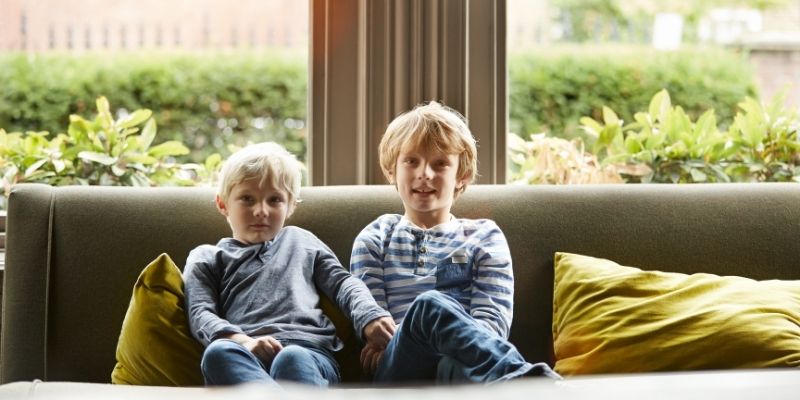How to Raise Well-Behaved Kids: 4 Proven Parenting Tips
Many parents desire well-behaved children. Parenthood is a journey of challenges, pleasures, and learning. While there is no one-size-fits-all answer, there are ways to assist youngsters behave. This blog article will discuss six proven parenting ideas to help you raise well-behaved kids and develop them emotionally and socially.

Knowing How Important Appropriate Behavior Is
Before discussing techniques, understand why excellent conduct is vital. Good-behaved youngsters achieve well in school, develop friends, and act socially. Good conduct typically requires emotional intelligence, self-control, and understanding. Parents who model these attributes educate their children on good behaviour and prepare them for future challenges.
Teaching kids excellent conduct starts with creating a secure and loving environment where they feel respected and protected. Kids behave better when they feel loved and cared for. Kids may express their desires without judgment in this compassionate environment that fosters trust and free communication.
Consistency Benefits You
Consistency is key to well-behaved youngsters. Children thrive when they know and can plan for their responsibilities. Kids learn right from wrong when rules and sanctions are always followed. Maintaining their views and understanding boundaries helps them understand them. Parents should behave like they want their children to. Kids watch their parents and frequently imitate them. Showing your youngsters patience, love, and respect will inspire them to emulate them.
Define rules and expectations.
Having explicit norms and standards helps manage kids' behaviour. Kids should know what to do in various situations. Setting defined guidelines gives them a platform to operate with confidence. Make sure your guidelines are age-appropriate and easy for your youngster. Instead of giving kids many restrictions, emphasize respect, honesty, and accountability. To express "no hitting," add "we use gentle hands."
Effective Rule Communication
Explain rules using simple language and examples to help your youngster comprehend. Sharing the rules with your kid might make them feel like they own them. People understand and follow through better with this combined strategy.
The rules must be obeyed regularly for discipline to function. Knowing your expectations will help your kids. Parents and kids might feel confused and upset if regulations aren't followed or consequences are altered.
Give them choices to encourage independence.
Having well-behaved, confident kids requires teaching them independence. Choices teach students critical thinking, independence, and decision-making. When they feel empowered, kids are more likely to take responsibility for their actions and comprehend their consequences.
Giving Age-Suitable Choices
Start by offering simple daily selections. Giving younger kids an option between two pieces of clothing or a nutritious snack after school might help them achieve this. Kids feel in control of their lives when they make these simple decisions. Let older kids help you make crucial decisions. Invite them to plan family events, personal objectives, or tasks. These opportunities teach youngsters life skills and obligations.
Balanced Guidance and Freedom
While supporting freedom is crucial, giving the correct guidance when making choices is, too. Discuss the outcomes of their decisions. This will help them weigh the benefits and downsides. We educate students on how to solve difficulties safely using this combo.
Let youngsters witness the natural effects of their decisions, as long as they are reasonable, to educate them. If your youngster doesn't wear a jacket on a chilly day, they'll feel the cold and learn to dress correctly next time. These exercises teach youngsters about their errors in a supervised environment.
Show people proper behaviour.
Kids watch and imitate their parents and other adults. One of the most excellent methods to teach kids appropriate behaviour and emotional management is to model it yourself.
Leading by example
Use kindness, patience, and understanding in your daily life. Manage your emotions effectively to teach your kid good behaviour. If you're unhappy about work, communicate your feelings gently before acting. This helps youngsters regulate their emotions and remember that healthy emotional expression is appropriate.
Teaching Using Examples
When appropriate, include your youngster in problem-solving discussions. Please show them your problem-solving and decision-making process. Show your spouse how to discuss and compromise if you disagree appropriately. Real-life examples teach us how to resolve disagreements and be emotionally savvy. Kids will follow suit if you model excellent conduct like listening, being appreciative, and being patient. They'll adopt these patterns and apply them in partnerships.
Make time for Family.
Families spend quality time together, strengthening ties and encouraging good conduct. Shared activities allow youngsters to interact, communicate, and learn, which improves their behaviour and mental health.
Participating in important activities
Quality time doesn't need much effort. Board games, reading, woodland walks, and culinary conversations might make individuals feel more connected. Parents may observe their children's behaviour and assist them at these moments.
Connecting to establish trust
Regular family time helps youngsters feel secure voicing what they want. Kids are more likely to accomplish their schoolwork or work effectively when they have time with their parents, such as a monthly family vacation or a weekly game night. Because they feel valued and understood. Making family traditions strengthens these bonds. Making meals every Sunday or going on annual vacations helps people recall happy times and bond.

Handle poor conduct calmly.
Misbehavior is part of growing up and learning the rules. How parents manage these events affects how well children grasp consequences and behave in the future.
Responding calmly and clearly
Be calm while dealing with misbehaviour. Rage or wrath may worsen situations and cause dread or anger. If you think before responding, you can manage the issue reasonably and helpfully.
Positive Discipline Methods
Instead of just scolding or grounding, use positive approaches to control that help youngsters learn from their mistakes:
- Redirect Children: Teach them better behaviour. If toddlers toss toys, teach them teamwork with a game.
- Explain Expectations: Use age-appropriate language to explain why certain activities are wrong. Remind them of the rules and future expectations. It will show them why limitations matter.
- Let youngsters see the natural consequences of their actions when it's safe and ethical. This shows them how their actions affect others without making them feel dominated.
- Positive reinforcement encourages excellent behaviour by rewarding it. People behave better when told, "I'm proud of how you handled that".
Parents who calmly and helpfully discipline their children teach them responsibility, compassion, and self-control.
Conclusion:
Ensuring your kids obey the rules won't make them behave. You must love and encourage them to do the right thing. Follow these six tried-and-true parenting practices to help your kids develop etiquette and emotional intelligence: Be explicit about your expectations while fostering autonomy; regularly exhibit excellent conduct; create time for family time; and gently handle negative behaviour.
Remember that parenting is about progress, not perfection! Every parent-child meeting educates and grows them. Enjoy this opportunity to assist children in becoming responsible individuals who contribute to society.












